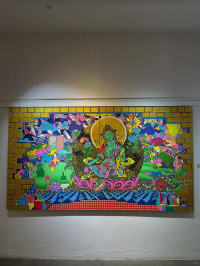Culture & Lifestyle
Telling stories that matter
Shanta Nepali, a filmmaker and entrepreneur, works to amplify the voices of marginalised communities through storytelling.
Timila Maharjan
Shanta Nepali is a filmmaker, entrepreneur, and founder of Shanta Nepali Production.
Alongside her filmmaking career, Nepali established the Shanta Foundation to empower marginalised women through art and storytelling. She is also the co-creator of Nepali Female Filmmakers (NFF), an open community that supports women in filmmaking through workshops, grants, and opportunities.
She has been to many places, as most of her filmmaking happens outdoors. This allowed her to work with different mountaineers and shoot documentaries. She says, “I used to film videos in high altitudes and climbed a few mountains for work.”
Nepali began her career in journalism, transitioning from print to radio and eventually to television. In television, she worked in production rather than in the news, as she felt that her work as a journalist didn’t have much of an impact. She used to work on the crime beat as she loved investigations and solving complex cases. As time went on, she found the work environment to be toxic and abusive. She shares, “I had to work late and meet different people at odd hours and places. The work environment was abusive, and there were many instances when people tried to harass me and take advantage of me.” This led her to choose travel and adventure.
Her first outdoor reporting experience was in 2009 with a Nepal Tourism Board project in Dhading while working in Ujyalo FM, promoting new trekking routes and homestays. This trip ignited her passion for exploring untold stories in Nepal’s remote areas, shifting her focus from crime to impactful storytelling. She says, “I discovered my passion for exploring new places, meeting people, and hearing their stories. Instead of revisiting the same individuals and locations in crime reporting, I found fulfilment in sharing ordinary people’s heartfelt stories.”
For work, she climbed mountains such as Chulu Far East (6059 meters in Manang) and Everest’s north side (7,000 meters). She even ascended to Europe’s highest peak as part of her projects. “When I’m in the mountains, I reach a different zone and connect with myself differently,” she explains. But later, she realised she didn’t see her future in mountain filmmaking due to its high risk and lack of security and facilities. The risks and physical demands of high-altitude filmmaking—from frostbite to life-threatening snowstorms—eventually made her step back from active mountaineering.
One of her harrowing experiences occurred in 2012 while shooting ‘Destination Nepal’ in Taplejung. While exploring the Lumba Sumba Pass, her team was trapped by heavy snowfall for four days. “We lost communication, and our navigation devices failed,” she recalls. Though they survived, some team members suffered severe frostbite. She feels scared just thinking about it and says, “We could’ve died if we were trapped there even for two more days.”
Working as a mountain filmmaker allowed her to build connections and gain confidence in her ability to lead projects. Eventually, she started her own production company. She shot travel shows when such content was rare. This equipped her with an understanding of TV show production.
Her love for storytelling deepened as she produced shows like ‘Kripa Unplugged’ and ‘Himalaya Roadies’, where she learned to manage large teams.
The skills and connections she built in her early years opened doors to international collaborations with platforms like National Geographic and Animal Planet. She even directed episodes for a documentary featuring actor Morgan Freeman.
After ‘Roadies,’ she took on more individual projects. With years of experience and exposure, she thought it was time to open a production company, so she started Shanta Nepali Productions in 2017.
Reflecting on her experience with international platforms, she highlights the contrasting work styles and mindsets between Nepal and the West. While punctuality and work prioritisation are key abroad, local context and culture play a significant role in Nepal. She emphasises the importance of balancing both approaches based on the situation.
Later, she started the Shanta Foundation in 2022 to empower women filmmakers, especially those from marginalised communities, through art and storytelling. A certain percentage of profit made from Shanta Nepali Productions is used in the Shanta Foundation. The foundation gives an award to a female filmmaker every year through the Nepal Human Rights Film Festival. It is running on internal funds only at the present, so they only have limited projects. Nepali says, “We want to do limited projects that are efficient and have an impact.”
Nepali Female Filmmakers (NFF) is an open community for female filmmakers which started as a Facebook group. It is a group of more than 200 women filmmakers at present. It began during the Covid-19 pandemic and organises script writing courses and training. It even provides small grants for emerging female filmmakers. It is also an open platform to share opportunities. Recently, she went to Los Angeles for a residency organised by Global Media Maker, which provided a small community grant. Using the grant, she organised a weekly cinematography workshop with NFF.
As someone from a marginalised community, Nepali observes that many still live in survival mode, unaware of the value of sharing their stories. Despite being independent and embracing risks from a young age, her journey as a filmmaker and journalist in a male-dominated field has been challenging. She compares it to navigating Kathmandu’s pothole-filled roads during the rain, requiring constant vigilance to avoid setbacks while moving forward. She says, “The outcomes that come while working without expectation give me immense happiness. It led me to start NFF. The increasing number of women filmmakers and the opportunities focused on them also make me happy.”
Nepali considers the success of TV shows like ‘Jaat ko Prashna’ and the upcoming ‘Caste Conversation’ key career milestones. These shows address caste issues, highlighting the lack of such discussions in families, schools, and communities. She believes caste discrimination is a human problem, not just a community issue, and her work often emphasises the lived experiences of marginalised people, as reflected in these productions.
She is currently working on her first feature film and a documentary. In the future, she wants to explore fiction filmmaking more. Her work has won various awards, including the John B Oakes Award in 2023. One of her short films, Dhye Dreams, was awarded the best documentary at KIMFF and the ICIMOD award. It was also awarded the best documentary at the Nepal-European Film Festival.
Nepali emphasises the importance of diverse representation in storytelling, saying, “Only people from certain groups are telling the stories of everyone. This leaves many unable to share their own experiences. People should be able to tell their own stories or be included in the storytelling process.”
For aspiring filmmakers, she advises entering the field only if they are passionate. “This profession demands confidence, immense commitment, and daily dedication,” she explains. Every day might look different, but you must consistently work on your craft to refine your skills.” Nepali also highlights the importance of working smartly rather than solely on hard work to make meaningful progress in the industry.




 14.24°C Kathmandu
14.24°C Kathmandu



.jpg&w=200&height=120)











